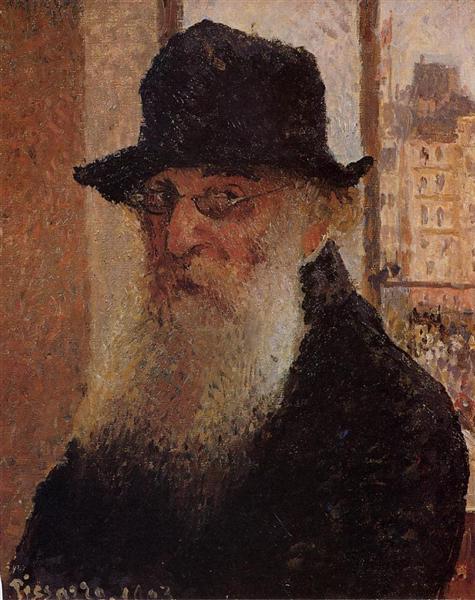Opis
In the 1903 painting “Self-Portrait,” Camille Pissarro offers a visual introspective that transcends conventional depictions of the artist. In this work, Pissarro portrays himself with an approach that reveals both his personal maturity and his artistic experience after decades of exploring light and color through the Impressionist movement. The image shows the artist with a serene, almost contemplative expression, in front of a background that is adorned with subtle hues, in homage to his dedication to the study of the environment and atmospheric effects in painting.
The use of color in this self-portrait is particularly noteworthy. Pissarro deploys a palette that ranges from the blues in the background to the warm hues that define his face. These color choices not only establish an emotional connection with the viewer, but also reflect his signature style of capturing light and movement through the fusion of colors. It is evident that the artist opts for a soft treatment in the use of the brush, achieving a sense of texture that is almost palpable.
The composition of the work is introspective, framing Pissarro in a half-length portrait that highlights his figure as the central element of the canvas. The artist wears a light-coloured shirt and a darker jacket, which contrast with the hazy background, allowing attention to fall on his face and gaze. This self-portrait is, without a doubt, a reflection on his own identity as an artist, at a time when his career was being consolidated and his influence on the Impressionist movement was increasingly recognised.
Through this self-portrait, Pissarro not only portrays himself, but also encapsulates a sensitivity that takes hold of the viewer. The artist's gaze is direct and profound; it invites contemplation and reflection on his life and work. The choice to make a portrait at the final stage of his career highlights a strong sense of self-evaluation and self-criticism, taking us into the inner world of a man who had dedicated his life to the exploration of perception and light.
It is essential to place this work in the context of Pissarro's career. Throughout his career, the artist had pioneered the technique of pointillism alongside Georges Seurat, but had also remained faithful to capturing the beauty of everyday life. This self-portrait is a closure or perhaps a summary of his artistic evolution, as it reveals both echoes of his early influences and the maturity acquired over time. The balance between tradition and innovation is palpable in the work, a testament to his enduring legacy in the art scene.
In sum, Camille Pissarro's Self-Portrait - 1903 is not just a reflection of the image of a man, but a profound examination of the artist's existence and his connection to the world around him. The work invites a broader dialogue about the nature of art and the human experience, reminding us of the powerful ability of art to communicate the inexpressible. In its simplicity, it captures the essence of Pissarro as an individual and as a pioneer in art history.
KUADROS ©, a famous painting on your wall.
Hand-made oil painting reproductions, with the quality of professional artists and the distinctive seal of KUADROS ©.
Painting reproduction service with satisfaction guarantee. If you are not completely satisfied with the replica of your painting, we will refund 100% of your money.

